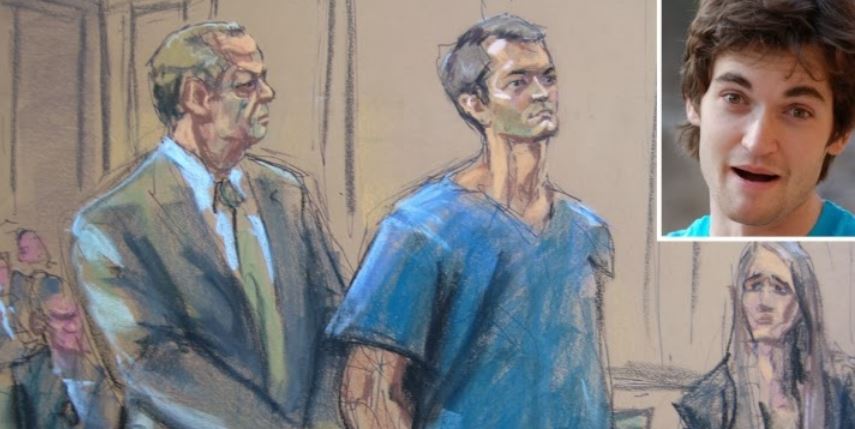 By Alice Salles
By Alice Salles
The pursuit of justice in the United States has never been never easy — or cheap.
In 2014, Texan Ross Ulbricht was convicted of founding and running the black market site known for drug sales, the “Silk Road,” under the pseudonym “Dread Pirate Roberts.” Due to his alleged involvement with the site, Ulbricht was convicted of drug trafficking and other charges in February 2015. Following a trial riddled with inconsistencies and likely corruption, he was sentenced to two life sentences.
While charges associated with an alleged murder-for-hire scheme were eventually removed from the indictment, a separate charge of “procuring murder” is still pending trial in Maryland. However, Ulbricht and his lawyers have always dismissed these charges, arguing there were multiple individuals who used the “Dread Pirate Roberts” name and that, regardless, no murders ever took place.
In order to help the Ulbricht family raise the $14,000 required to appeal Ross’s double-life sentence for nonviolent charges, a group of free-thinking and libertarian-leaning economists, policy researchers, artists, authors, journalists, politicians, and entrepreneurs held a “Free Ross-a-thon” on Sunday, December 4th.
While the main goal of the event was to pool enough money to ensure the “printing and binding” of the “appeal documents for the court,” the event also sought to bring awareness to Ulbricht’s case and its context, which is deeply entrenched in the drug war.
During the event, many of the participants touched on drug prohibition — the ongoing federal and state governments’ effort to target all drug use and commerce. But one of the most compelling arguments linking Ulbricht’s case and the drug war came from Roger Ver, a Bitcoin angel investor who supports him.
“The question isn’t: should drugs be legal or illegal,” Ver told viewers. “The question should be: Does each individual human being own their own body?”
Implying Ulbricht’s case is solely about an individual breaking immoral drug laws, Ver told the group and viewers he is “probably the only person on this call who has actually spent time in federal prison.” Ver continued that as a federal prisoner, “[he] got to see firsthand somewhere between 70 and 90 percent of the people [he] was there with were there for victimless crimes,” including individuals who were handed 15-year sentences for selling marijuana.
“Did morality change when politicians wrote down different words on a piece of paper?” Ver asked, answering his own question by arguing the problem is not what’s in the law. Rather, he argued, the problem has always been that the “laws were wrong to begin with.”
During the pro-Ulbricht event, Ross’s mother, Lyn Ulbricht, discussed other implications of the Silk Road case, drawing the conversation toward Bitcoin, a currency used heavily on the dark web exchange (establishment media has linked Bitcoin to dangerous online drug sales).
“I know you’re known for Bitcoin,” Mrs. Ulbricht told Bitcoin angel investor Roger Ver while thanking him for being such an important part of the Free Ross movement, “but you’re [also] a freedom fighter. You’re someone who cares about liberty and that is something I think is even more important than Bitcoin,” she continued.
“The reason I got involved in Bitcoin is because I’m interested in voluntaryism and voluntary human interaction,” he told Mrs. Ulbricht. After all, he continued, “that’s how everybody deals with everybody else, … with one giant, glaring exception and that’s the state.”
“If Starbucks uses some of its money to drop bombs, I wouldn’t shop there so why would I support the American empire,” he added, evoking the words of activist and radio host Derrick J. Freeman.
Jan 1 2017 – Trigger Event for the US Dollar? (Ad)
At the end of the day, the Silk Road provided a voluntary platform for drug sales using technology including Bitcoin, and his actions worked to subvert the government’s anti-drug policies.
While many have always insisted that the Free Ross movement is misguided, claiming they somehow have done a “great disservice” to efforts to end the drug war, in an article for the Foundation for Economic Education, economist Robert Murphy confirms that — with the exception of the murder-for-hire charges — all crimes Ulbricht is accused of committing are “victimless.” This has prompted libertarians and those who agree with libertarian principles to call for Ulbricht’s release.
That’s why this case and the subsequent coverage and debate are important: because they force us to discuss the drug war.
If Ulbricht did create a market that was, for some time, free from government interference, he helped countless consumers gain access to drugs they wouldn’t be able to obtain in a ‘normal’ setting, making him yet another victim of the drug war — after all, he wouldn’t have ventured into the deep web if it hadn’t been for the restrictions imposed by prohibitionist policies.
Ulbricht never personally sold drugs on his decentralized exchange, but rather, provided a platform for others to do so. Still, the U.S. justice system considers the fact that he might have created this marketplace at all to be a much more sordid crime than drug trafficking. As he was handed a double-life sentence for what libertarians often call “victimless crimes,” many began to question the harsh ruling, pointing out New York City Federal Judge Katherine Forrest’s claims regarding Ulbricht’s double-life term; she said the harsh sentence was “meant to serve as a message to discourage other people from following in Ulbricht’s path.”
But that’s not the only reason this case is relevant. It’s also important because it forces us to question the government’s intrusive tactics in pursuing particular cases, especially considering that Ulbricht’s case sets a precedent that paves the way for the prosecution of digital currency users and entrepreneurs.
The Tech Side of Ulbricht: How the Silk Road Case Sets a Precedent
After the Ulbricht trial, two Silk Road investigators were convicted of using “pseudonyms to steal bitcoins from the site, [attempting] to extort money from Ulbricht, and also [having] sold him law enforcement information.” One secret service agent on the case confessed to stealing $800,000 worth of the digital currency. These facts alone serves as an example that despite the widespread coverage, few bring up the involvement of the corrupt agents in the justice system — and the possibility they may have tampered with evidence electronically by hacking into Ulbricht’s alleged account.
 Recently, lawyers defending Ulbricht pointed out that a third corrupt agent may have been discovered in the case.
Recently, lawyers defending Ulbricht pointed out that a third corrupt agent may have been discovered in the case.
In recently unveiled private chats, Ulbricht’s pseudonym, Dread Pirate Roberts, talks to a user known as “albertpacino,” “alpacino,” or “notwonderful,” who offers “information about the law enforcement investigation into Silk Road” to the Silk Road creator in exchange for weekly payments.
Claiming these “chats didn’t appear in earlier versions of the forum logs shared by the prosecution and defense,” Ulbricht’s lawyers have suggested that “someone in law enforcement tampered with evidence to cover up those conversations.”
As the Ulbricht family gears up for yet another round of appeals in light of new evidence, it’s important to analyze Ross’s case in light of how the State has used him as an example to discourage similar subversive behavior from others.
With libertarianism and free association becoming more popular across the country, the idea that an individual accused of refusing to comply with the rules of the system could be set free certainly poses a threat to State dominance.
It’s clear that many agents within the government may have had incentives to push Ulbricht’s sentence to the limit. Nevertheless, these are just theories. We can only say for certain that there is something foul about this case once evidence is unearthed.
Until then, it’s important to discuss the obvious drug war-related themes associated with the case without forgetting to stress the importance of putting an end to an immoral set of laws like those that comprise, which only creates more deadly black markets. In the process, let’s not forget to bring awareness to how this case sets a precedent in other fields, one that may put other entrepreneurs and digital currency users in grave legal danger.
You can learn more about Ulbricht’s case and donate to his cause here.
This article (Silk Road Case Sets Precedent for Total Government Control of Currency) is free and open source. You have permission to republish this article under a Creative Commons license with attribution to Alice Salles and theAntiMedia.org. Anti-Media Radio airs weeknights at 11 pm Eastern/8 pm Pacific. If you spot a typo, please email the error and name of the article to edits@theantimedia.org.

And yet the ‘Pay for Play’ unholy swamp bipeds go unaccounted.
Ok to sell state secrets and so long as the pizza is hot.
There is no Rule of Law.